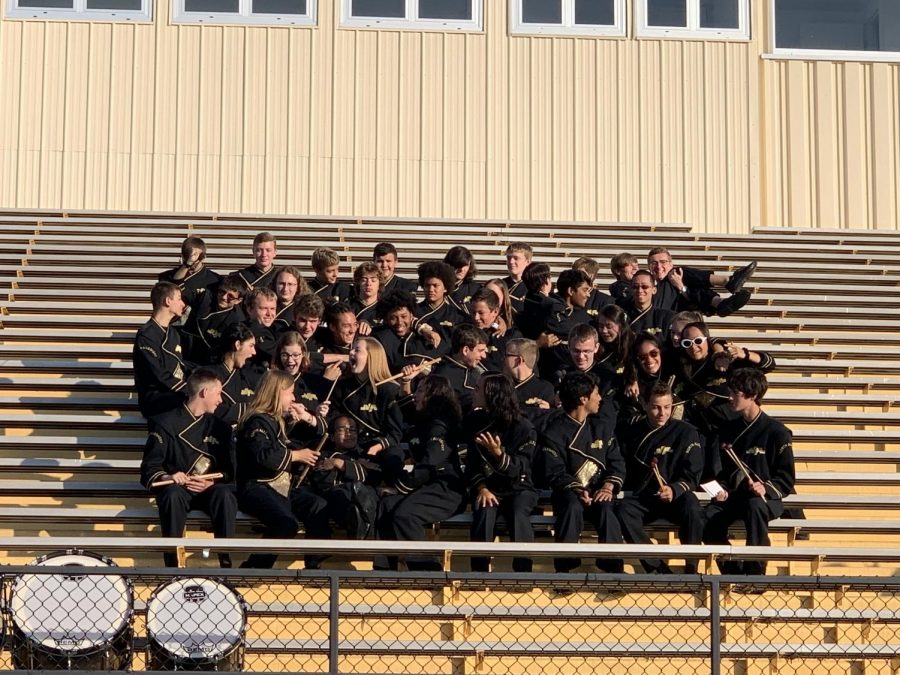HONAI: NA Percussionists
Friday night football is a highlight at the end of a long weekend. Behind the scenes, the percussion section in marching band is perfecting movements. This story shows the dedication you must have to join the drumline and front ensemble.
A lot of people go to football games to only hang out with friends and watch the football team compete against a rival team. What they don’t see, is a whole other group that puts in the same amount of time, skill, and dedication.
The North Allegheny Tiger Marching Band as a whole puts in countless hours of practice, not to mention the games, festivals, and parades they play for. One of the crucial parts of the band is percussion. They keep time, play difficult rhythms at fast tempos, and start off movements. Being apart of the percussion section is tough but fun.
Just like any sports team, percussionist undergoes workshops, practices, and tryouts. It all starts in the summer. Workshops are every Tuesday in July, and incoming freshmen can learn the ways of battery and front ensemble. Everyone learns what they need to play for tryouts, and that’s when the fun really begins.
Drum captains Malia Wilson and Brett McCutcheon gave more details on the drumline.
What convinced you to join percussion?
Brett: I was actually forced to do marching band for the first year. I’m really glad my parents made me.
Malia: In seventh grade, I found out about this thing called Drum Corps [International], which is basically a world-class marching band. I thought it was super cool and I especially loved the idea of being a part of something bigger than myself while bonding with others. So, I taught myself marching snare technique and eventually tried out for drumline. [It’s the] best decision I’ve ever made!
What is the hardest part about being in the Drumline?
Brett: The hardest part about doing Drumline is the constant mental focus. After we learn our music and develop muscle memory for our shows, we have to focus on making everything clean. It’s not like the best lines can take reps off and stop thinking.
Malia: The hardest part about Drumline is actually something all Marching Band members can relate to – the multitasking. You have to think about notes while you’re moving, but on top of that, you have to think about the proper technique, the volume, and the tone you’re producing. You have to be 100% focused all the time or else you’ll slip up, and when one person in drumline makes a mistake, it’s as if the whole drumline is making the mistake.
Do you think the drumline is underestimated or a standout feature in Marching Mand?
Brett: I believe the drumline is misunderstood for being just a Marching Band gig. We participate in concert bands, concert percussion, and a competitive indoor percussion ensemble as well. A lot of us work all year to do all sorts of things.
Malia: In recent years, the drumline has really started to improve and I think our shows reflect that. I believe my freshmen year was the first year we had the kind of drum break we did, and ever since then, we’ve had one movement in every show dedicated to drumline/front ensemble. I’m really proud of the work we have all put in. I hope that after I leave drumline keeps getting better.
How long do you practice outside of practice?
Brett: Daily practice is something we emphasize pretty hard. We have the muscle memory to maintain, which is easy practice for the week, but learning music requires more work.
Malia: This is a difficult question because it varies. Over the summer I’m able to practice for an hour or more a day because of my lack of commitments, but that changes during the school year. It’s a combination of homework, school tiring me out, and built-in practice time three days a week for most of the year (after marching band there’s an activity called indoor drumline, so playing drums is essentially a year-round commitment), that makes me start to lack with one or the other. Right now, I’m getting ready for an audition in November, so I am literally practicing any time I am not in a class, doing homework, or sleeping. At school, I drum during every free period and all available downtime. I try to get in two or more hours at home.
Would you recommend joining percussion?
Brett: Of course I would recommend people to join percussion. It’s a great experience to get to be so close with people basically year-round. You develop relationships and learn so much about people, including yourself.
Malia: 100%. I’ve met my best friends through this, found a passion that drives me, and have had experiences I wouldn’t trade for the world. It’s hard work, but it’s worth it.
Percussionist must learn all their show music before the entire band starts practicing. On top of learning show music, percussion must learn all the cadences and the parade tunes. Drumline must remember their dots, and front ensemble must learn their riffs at the right tempo. Both drumline and front ensemble must memorize their music by the first show. Although it is a difficult job, NA has provided amazing band instructors and percussion instructors to help guide the percussion section. With the help of Steve Baldanzi, Todd Stefan, Evan Brown, Stevie Pachesky, Matt Gillot, Zach Everett, and Megan Raughter, the percussionists achieve full runs of the show quickly and successfully.
Band instructor/percussionist Todd Stefan explained what it’s like to teach percussion and the importance they bring.
Would you say that percussion as a whole is crucial to Marching Band and why?
Stefan: Absolutely, it’s the heart of the whole band, and it’s where the pulse is.
What drew you to percussion?
Stefan: My dad was a drummer in high school, and he gave me his Gretsch, silver sparkle, and snare drum, when I was a kid.
Is percussion easy to learn?
Stefan: No, there are so many facets to it and there are so many instruments in percussion. Especially in concert band, you can be called to play snare on one song then something else on a different song.
If you had to describe percussion in one word what would it be and why?
Stefan: Cool. It visually looks cool, when it’s done right.
Percussion is broken down into 2 different sections. The drumline keeps the beat for the band, and the front ensemble plays the melody. Both drumline and front ensemble is broken down into even smaller groups. The NA Drumline consists of 12 snares, 4 combos, 5 bass drums, and 4 quads. The front ensemble consists of 5 marimbas, 6 vibraphones, 1 drum set, 1 rack, 1 xylophone, 1 Glock, and 2 synths. Each member of the drumline and front ensemble have different parts that take time and practice to play.
Senior Noah Dibiasi and Sophmore Cassandra Pultorak gave more details of what it’s like to be in the front ensemble.
What attracted you to marching band?
Noah: The half time show, the Empire State of Mind show during my eighth-grade year was what drew me into going to Marching Band in freshman year.
Cassandra: The people in percussion, specifically the front, during my Eighth-Grade Night really made me want to join the Marching Band. I already loved percussion, but I was really on the fence whether to do Marching Band, and Mrs. Granite helped me make that decision.
How long do you practice outside of the designated band practice?
Noah: I try to fit in half an hour to an hour of practice each day, whether that be through basic exercises, running chunks of a show, or reading through new music to get notes.
Cassandra: I practice a pretty good amount outside of our regular rehearsals. Obviously, because of homework, it’s not as much as I’d like to practice, but I am in the works of signing up with a private teacher very soon. Other than that, I practice in my free time so it varies. Around 45 minutes each day, I don’t have percussion.
What is the hardest song you’ve learned?
Noah: The opener from the 2017 show, I’d say was the hardest movement I’ve played, which was a remix of Gold by SirSly. I’d say that had the hardest chunks I’ve had to play in Marching Band.
Cassandra: The hardest movement I learned was in our indoor season. It was our first movement, Even Flow by Pearl Jam. The arrangement was really hard for it only being my second season of percussion
Do you think the front ensemble is a crucial part of Marching Band?
Noah: I most certainly believe it is, especially this year. Without the front ensemble, the show would simply not be the same or even entertaining in some aspects. A rock show isn’t best done without a drum set, for instance.
Cassandra: I think in general it’s not as huge a part, but in NA, our show would be incredibly different without vocals, and front ensemble.
Would you recommend joining percussion?
Noah: If you’re interested in seeing what we’re all about, I’d recommend giving percussion a shot.
Cassandra: I would recommend percussion to anyone. I think it’s such an amazing environment, and I’ve never met better people in my life. It impacted and helped me so much my freshman year, and I would want everyone to have things like that in their life.
Joining the percussion section is like joining a family. There is a tight bond between all of the members, and it is always a guaranteed, fun time.

Mia Simmons is a sophomore at NAI this year. This is her first year in journalism and she is very excited about what is in store for the oncoming year....



Susan Simmons • Dec 7, 2019 at 7:31 am
Great article! I always come to the football game to see the band, but I’m a grandmother going to see her kids. You’re so right about the time and effort it takes to excel individually and as a group. I enjoyed reading this.